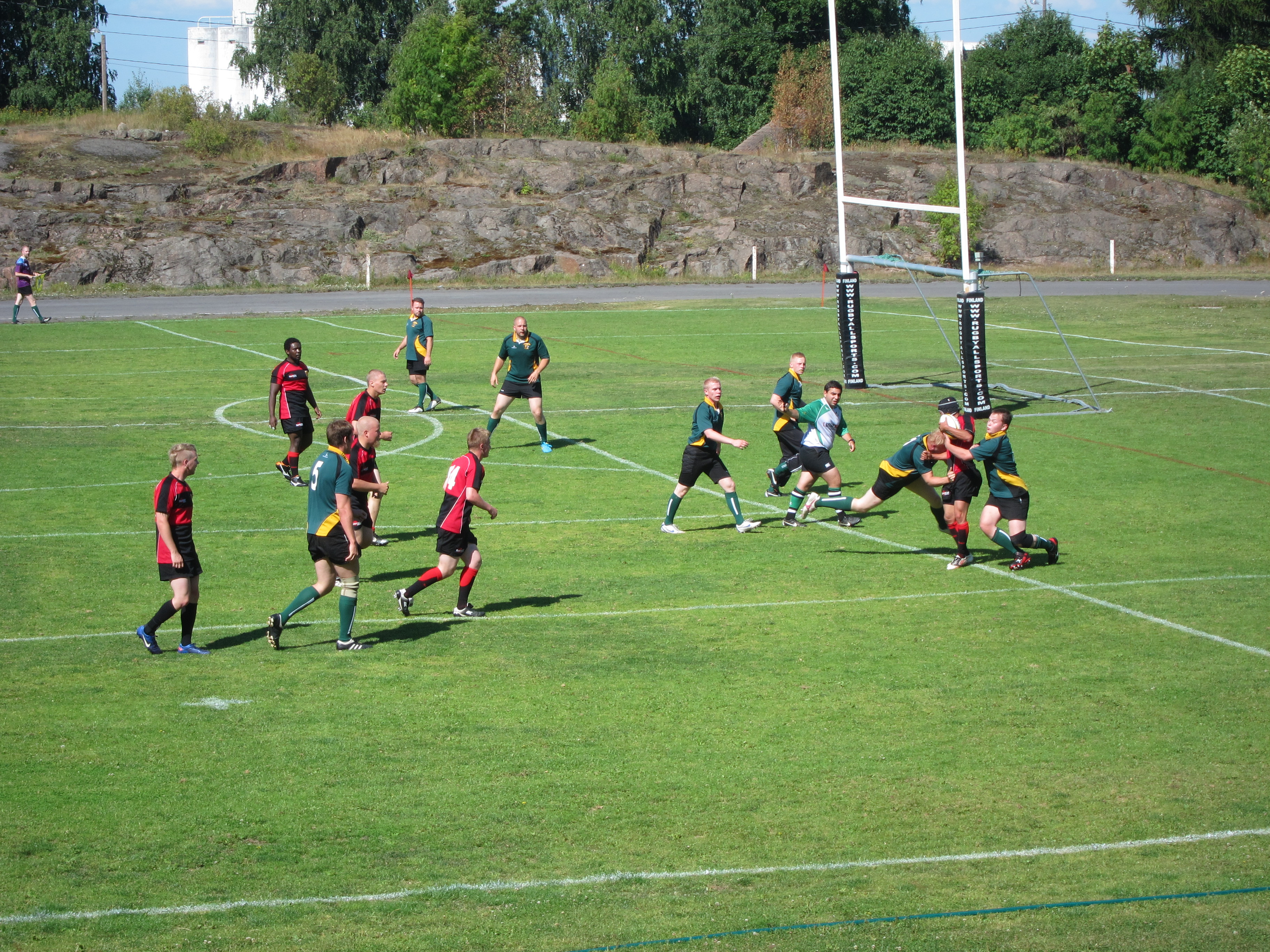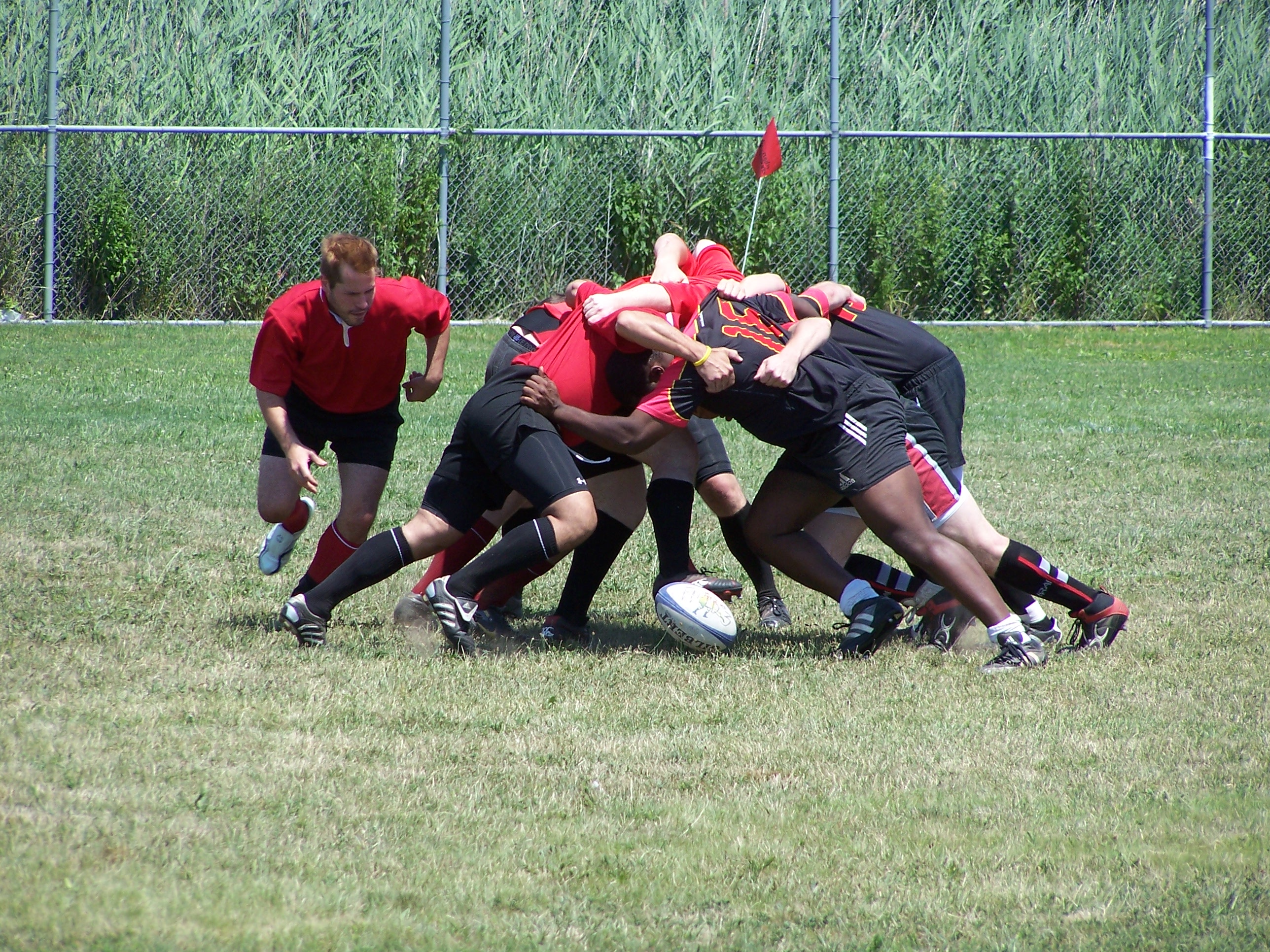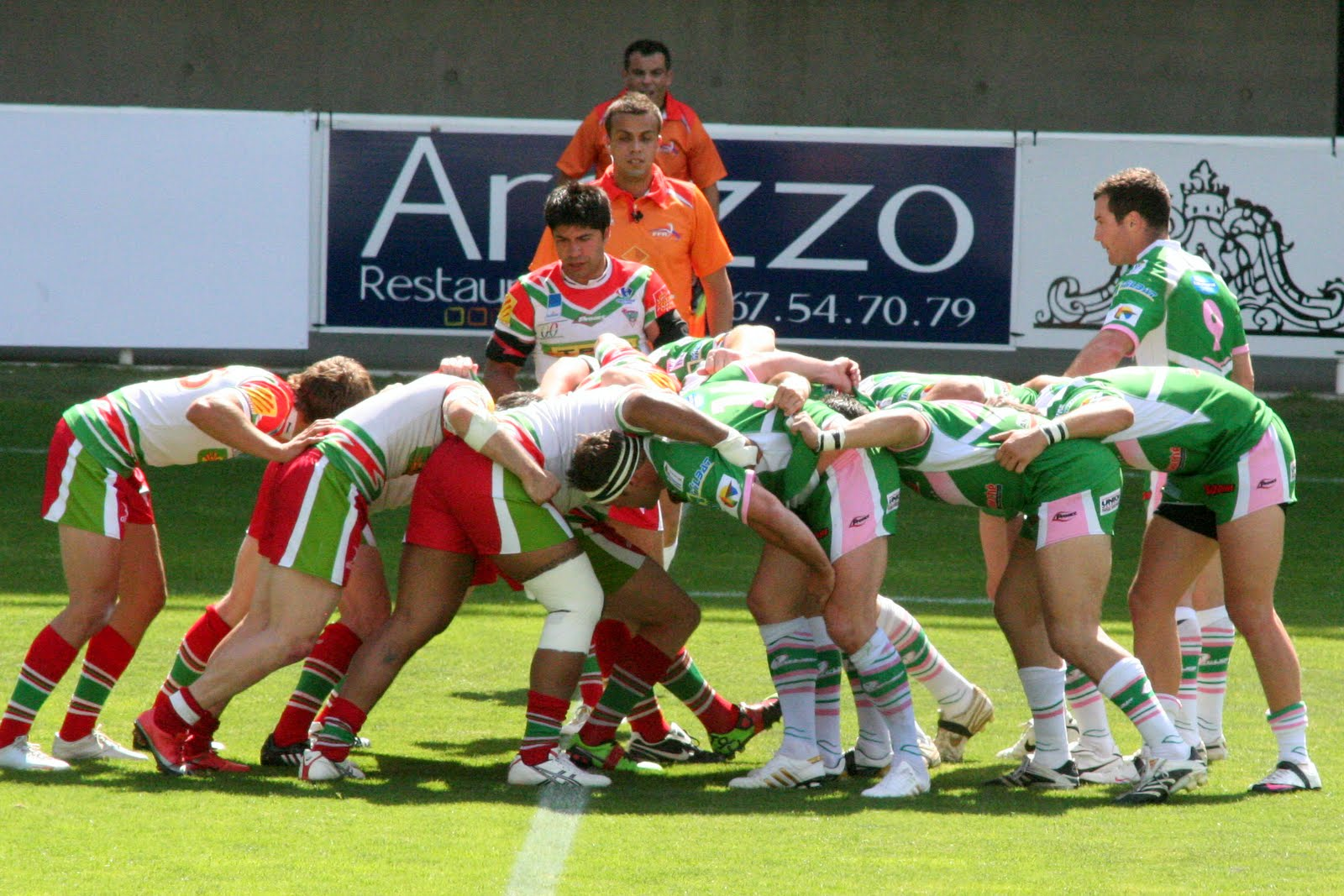|
Ball Back
Ball back is a piece of terminology in both codes of rugby football. In both codes of rugby, if the ball enters touch, then play is restarted (either by a line-out in rugby union or a scrum in rugby league) level with the point where the ball left the field of play. The exception to this is if the ball is kicked into touch without first bouncing inside the field of play (on the full). In this case, the scrum or line-out is taken from level with the place from where the ball was kicked, and not from where it entered touch. Ball back is waived in certain circumstances: *If a side elects to kick a penalty into touch *If the kicking player is inside his own 22m line when he kicks the ball, and (under the ELVs) the ball has not been immediately passed or run back into the 22 (rugby union only) See also * Line-out (rugby union) * Penalty (rugby) * Scrum (rugby) A scrummage, commonly simply known as a scrum, is a method of restarting play in rugby football that involves players ... [...More Info...] [...Related Items...] OR: [Wikipedia] [Google] [Baidu] |
Terminology
Terminology is a group of specialized words and respective meanings in a particular field, and also the study of such terms and their use; the latter meaning is also known as terminology science. A ''term'' is a word, compound word, or multi-word expressions that in specific contexts is given specific meanings—these may deviate from the meanings the same words have in other contexts and in everyday language. Terminology is a discipline that studies, among other things, the development of such terms and their interrelationships within a specialized domain. Terminology differs from lexicography, as it involves the study of concepts, conceptual systems and their labels (''terms''), whereas lexicography studies words and their meanings. Terminology is a discipline that systematically studies the "labelling or designating of concepts" particular to one or more subject fields or domains of human activity. It does this through the research and analysis of terms in context for the pu ... [...More Info...] [...Related Items...] OR: [Wikipedia] [Google] [Baidu] |
Rugby Football
Rugby football is the collective name for the team sports of rugby union and rugby league. Canadian football and, to a lesser extent, American football were once considered forms of rugby football, but are seldom now referred to as such. The governing body of Canadian football, Football Canada, was known as the Canadian Rugby Union as late as 1967, more than fifty years after the sport parted ways with rugby rules. Rugby football started about 1845 at Rugby School in Rugby, Warwickshire, England, although forms of football in which the ball was carried and tossed date to the Middle Ages (see medieval football). Rugby football spread to other Public school (United Kingdom), English public schools in the 19th century and across the British Empire as former pupils continued to play it. Rugby football split into two codes in 1895, when twenty-one clubs from the North of England left the Rugby Football Union to form the Rugby Football League, Northern Rugby Football Union (renamed ... [...More Info...] [...Related Items...] OR: [Wikipedia] [Google] [Baidu] |
Line-out (rugby Union)
A line-out or lineout is a means by which, in rugby union, play is restarted after the ball has gone into touch. When the ball goes out of the field of play, the opposing team is normally awarded a line-out; the exception is after the ball is kicked into touch from a penalty kick, when the team that was awarded the penalty throws into the line-out. In 2021 World Rugby began trialling what was dubbed the "50:22" (or "50–22") rule, wherein the kicking team has the throw-in if the ball travels from the kicker's half and bounces beyond the opposing 22-meter line. This was inspired by rugby league's 40/20 kick. A line-out is formed by players from each team lining up inside the touchline, at 90° to it. A player from the side that did not put the ball into touch then throws the ball back into play. A line-out is one of the two methods of restarting play after the ball has gone into touch, the other is the "quick throw-in" (sometimes referred to as a quick line-out). Due to the specif ... [...More Info...] [...Related Items...] OR: [Wikipedia] [Google] [Baidu] |
Rugby Union
Rugby union, commonly known simply as rugby, is a close-contact team sport that originated at Rugby School in the first half of the 19th century. One of the two codes of rugby football, it is based on running with the ball in hand. In its most common form, a game is played between two teams of 15 players each, using an oval-shaped ball on a rectangular field called a pitch. The field has H-shaped goalposts at both ends. Rugby union is a popular sport around the world, played by people of all genders, ages and sizes. In 2014, there were more than 6 million people playing worldwide, of whom 2.36 million were registered players. World Rugby, previously called the International Rugby Football Board (IRFB) and the International Rugby Board (IRB), has been the governing body for rugby union since 1886, and currently has 101 countries as full members and 18 associate members. In 1845, the first laws were written by students attending Rugby School; other significant even ... [...More Info...] [...Related Items...] OR: [Wikipedia] [Google] [Baidu] |
Scrum (rugby)
A scrummage, commonly simply known as a scrum, is a method of restarting play in rugby football that involves players packing closely together with their heads down and attempting to gain possession of the ball. Depending on whether it is in rugby union or rugby league, the scrum is used either after an accidental infringement or when the ball has gone out of play. Scrums occur more often, and are now of greater importance, in union than in league. Starting play from the line of scrimmage in gridiron football is derived from the scrum. In both forms of rugby, a scrum is formed by the players who are designated forwards binding together in three rows. The scrum then 'engages' with the opposition team so that the players' heads are interlocked with those of the other side's front row. In rugby union the initiation of the process is verbally coordinated by the referee who calls 'crouch, bind, set' as of 2013 (formerly 'crouch, touch, pause, engage', 'crouch and hold, engage' before ... [...More Info...] [...Related Items...] OR: [Wikipedia] [Google] [Baidu] |
Rugby League
Rugby league football, commonly known as just rugby league and sometimes football, footy, rugby or league, is a full-contact sport played by two teams of thirteen players on a rectangular field measuring 68 metres (75 yards) wide and 112–122 metres (122 to 133 yards) long with H shaped posts at both ends. It is one of the two codes of rugby football, the other being rugby union. It originated in 1895 in Huddersfield, Yorkshire as the result of a split from the Rugby Football Union over the issue of payments to players.Tony Collins, ''Rugby League in Twentieth Century Britain'' (2006), p.3 The rules of the game governed by the new Northern Rugby Football Union progressively changed from those of the RFU with the specific aim of producing a faster and more entertaining game to appeal to spectators, on whose income the new organisation and its members depended. Due to its high-velocity contact, cardio-based endurance and minimal use of body protection, rugby league i ... [...More Info...] [...Related Items...] OR: [Wikipedia] [Google] [Baidu] |
Penalty (rugby)
In rugby football, the penalty is the main disciplinary sanction available to the referee to penalise players who commit deliberate infringements. The team who did not commit the infringement are given possession of the ball and may either kick it towards touch (in which case the ball back rule is waived), attempt a place kick at goal, or tap the ball with their foot and run it. It is also sometimes used as shorthand for ''penalty goal''. Penalties in rugby union The referee signals that he has awarded a penalty to a side by raising his arm at 45 degrees between vertical and horizontal and blowing a blast on his whistle. The arm is raised on the side that won the penalty. Penalties may be awarded for a number of offences, including: * Failing to release the ball after being tackled, or the tackling player failing to release the tackled player or doing a dangerous tackle on the other player. * Entering a ruck or maul from the side. * Leaving one's feet in the ruck. * Deliberatel ... [...More Info...] [...Related Items...] OR: [Wikipedia] [Google] [Baidu] |
Experimental Law Variations
The experimental law variations (ELVs) were a proposed set of amendments to the laws of rugby union. They were proposed by the sport's governing body, the International Rugby Board (IRB), and trialled games at Stellenbosch University in 2006. In 2008 thirteen of the 23 variations trialled were played globally including; greater responsibility for assistant referees, corner posts no longer considered to touch in-goal, no gain in ground if the ball is moved into the 22-metre line by a player from the same team as the kicker, quick throw ins can travel backwards, no restrictions to players in the lineout, restrictions on where receivers and opposition hookers can stand in a lineout, pregripping and lifting allowed, mauls can be pulled down and players can enter with their head and shoulders lower than their hips, offside line is five metres away from the scrum for the backs and scrum half must be positioned close to the scrum, all offences apart from foul play and offsides are a free ... [...More Info...] [...Related Items...] OR: [Wikipedia] [Google] [Baidu] |
Line-out (rugby Union)
A line-out or lineout is a means by which, in rugby union, play is restarted after the ball has gone into touch. When the ball goes out of the field of play, the opposing team is normally awarded a line-out; the exception is after the ball is kicked into touch from a penalty kick, when the team that was awarded the penalty throws into the line-out. In 2021 World Rugby began trialling what was dubbed the "50:22" (or "50–22") rule, wherein the kicking team has the throw-in if the ball travels from the kicker's half and bounces beyond the opposing 22-meter line. This was inspired by rugby league's 40/20 kick. A line-out is formed by players from each team lining up inside the touchline, at 90° to it. A player from the side that did not put the ball into touch then throws the ball back into play. A line-out is one of the two methods of restarting play after the ball has gone into touch, the other is the "quick throw-in" (sometimes referred to as a quick line-out). Due to the specif ... [...More Info...] [...Related Items...] OR: [Wikipedia] [Google] [Baidu] |
Penalty (rugby)
In rugby football, the penalty is the main disciplinary sanction available to the referee to penalise players who commit deliberate infringements. The team who did not commit the infringement are given possession of the ball and may either kick it towards touch (in which case the ball back rule is waived), attempt a place kick at goal, or tap the ball with their foot and run it. It is also sometimes used as shorthand for ''penalty goal''. Penalties in rugby union The referee signals that he has awarded a penalty to a side by raising his arm at 45 degrees between vertical and horizontal and blowing a blast on his whistle. The arm is raised on the side that won the penalty. Penalties may be awarded for a number of offences, including: * Failing to release the ball after being tackled, or the tackling player failing to release the tackled player or doing a dangerous tackle on the other player. * Entering a ruck or maul from the side. * Leaving one's feet in the ruck. * Deliberatel ... [...More Info...] [...Related Items...] OR: [Wikipedia] [Google] [Baidu] |
Scrum (rugby)
A scrummage, commonly simply known as a scrum, is a method of restarting play in rugby football that involves players packing closely together with their heads down and attempting to gain possession of the ball. Depending on whether it is in rugby union or rugby league, the scrum is used either after an accidental infringement or when the ball has gone out of play. Scrums occur more often, and are now of greater importance, in union than in league. Starting play from the line of scrimmage in gridiron football is derived from the scrum. In both forms of rugby, a scrum is formed by the players who are designated forwards binding together in three rows. The scrum then 'engages' with the opposition team so that the players' heads are interlocked with those of the other side's front row. In rugby union the initiation of the process is verbally coordinated by the referee who calls 'crouch, bind, set' as of 2013 (formerly 'crouch, touch, pause, engage', 'crouch and hold, engage' before ... [...More Info...] [...Related Items...] OR: [Wikipedia] [Google] [Baidu] |
Rugby League Terminology
Rugby may refer to: Sport * Rugby football in many forms: ** Rugby league: 13 players per side *** Masters Rugby League *** Mod league *** Rugby league nines *** Rugby league sevens *** Touch (sport) *** Wheelchair rugby league ** Rugby union: 15 players per side *** American flag rugby *** Beach rugby *** Mini rugby *** Rugby sevens, 7 players per side *** Rugby tens, 10 players per side *** Snow rugby *** Touch rugby *** Tambo rugby ** Both codes *** Tag rugby *Rugby Fives, a handball game, similar to squash, played in an enclosed court *Underwater rugby, an underwater sport played in a swimming pool and named after rugby football *Rugby ball, a ball for use in rugby football Arts and entertainment * '' Rugby'' (video game), the 2000 installment of Electronic Arts' Rugby video game series * ''Rugby'', second movement of ''Mouvements symphoniques'' by Arthur Honegger Brands and enterprises * Rugby (automobile), made by Durant Motors * Rugby Cement, a former UK PLC, now a su ... [...More Info...] [...Related Items...] OR: [Wikipedia] [Google] [Baidu] |





